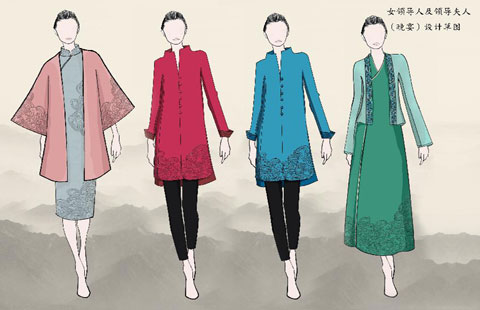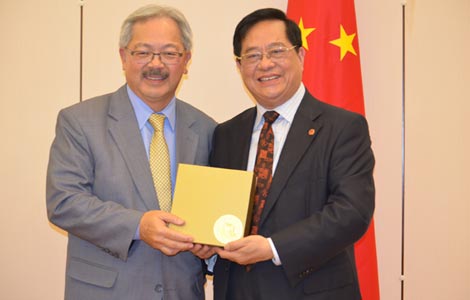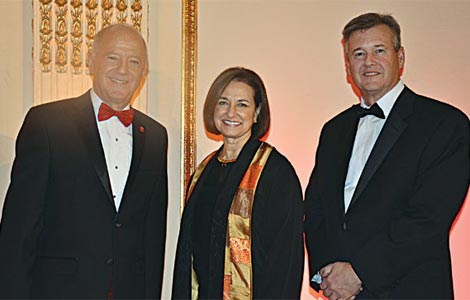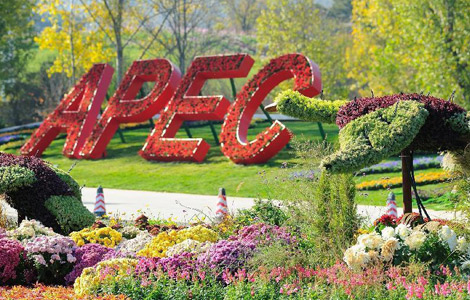Visit brings schools closer
Updated: 2014-11-13 04:47
By Zhang Yue in Beijing(China Daily USA)
|
||||||||
A recent visit to China by a delegation from Arizona State University has led to an initiative that will gather research professionals from universities in the United States to identify opportunities for cooperation with their Chinese counterparts.
The initiative, named the Global University Alliance, will focus on research and development, technology transfer and commercialization.
The one-week visit by the delegation, led by Arizona State University President Michael M. Crow, also produced a memorandum of understanding with Shandong University in Tsingdao. The group also visited the university's Bio-design center, which receives academic support from ASU.
Crow said the visit was also an effort to work with the XJTU-HKUST Joint School of Sustainable development (JSSD), which was jointly established by Xi'an Jiaotong University and Hong Kong University of Science and Technology (HKSUT) in 2012.
Last month, Crow met with Jingshen Wu, a professor in the Department of Mechanical & Aerospace Engineering at HKSUT, who is also a key member of the SSD committee. He shared his ideas about ASU joining them, with their American perspective, in developing sustainability. He said that ASU, with its pioneering experience in developing its own school of sustainability, is willing to take on a role.
In 2006, ASU became the first university in the US to establish its own School of Sustainability. The school was founded by Crow, shortly after he transferred from the Earth Institute at Columbia University in New York City.
"By the time I was still working with the Earth Institute, I already found that in today's globalization process, problems cannot be solved with knowledge of a single subject," he said.
The School of Sustainability at AUS focuses on finding real-world solutions to environmental, economic, and social challenges by teaching interdisciplinary subjects. The school offers bachelor of arts and sciences degrees and certificates in energy and sustainability. It also has master's degree program in sustainable solutions, and an executive master's in sustainability leadership.
"When the school of sustainability was established 10 years ago many universities actually laughed at us on the new try," Crow said. "But now, in recent years, all of our graduates have managed to land a job."
He said that most students from the School of Sustainability were hired by regular industries such as a company's finance department, but mostly in sustainability positions, because in the United States there are many things at companies that require an understanding of sustainability.
"I think, globally, the notion that you have to go to a particular major such as chemical engineering or finance to get a job is not true today." he said. "For example, studying pollution and environment only can never solve the pollution problem. The problem is very complicated and very diverse."
The school of sustainability in ASU now has more than 300 faculty members and about 2,000 students minor in sustainability.
However, although the school has shown a good employment rate, Crow said that building a school of sustainability hasn't become a trend for universities in the US so far.
"The key reason is linear thinking and those faculties who still want to stay behind single disciplines, the old model in which they used to get trained," he said.
Contact the writer at zhangyue@chinadaily.com.cn

 All cheers for wedding expos
All cheers for wedding expos
 Magnificent fireworks showed at APEC grand banquet
Magnificent fireworks showed at APEC grand banquet
 Chinese-style outfits designed for participants of APEC
Chinese-style outfits designed for participants of APEC
 Aviation airshow takes off in S China’s Guangdong
Aviation airshow takes off in S China’s Guangdong
 Consul-General Yuan says goodbye to San Francisco
Consul-General Yuan says goodbye to San Francisco
 Kissinger: 'Overcome' issues
Kissinger: 'Overcome' issues
 Peaking for APEC
Peaking for APEC
 Scenery near Yanqi Lake in Beijing
Scenery near Yanqi Lake in Beijing
Most Viewed
Editor's Picks

|

|

|

|

|

|
Today's Top News
Visit brings schools closer
Anbang US hotel deal raises queries
A stroll sets stage for diplomacy
Shanghai railway stations use US Wi-Fi technology
Tencent looks to the final travel frontier
Relaxed stroll sets mood for Xi, Obama
All cheers for wedding expos
Night view of Beijing's APEC Meeting site
US Weekly

|

|








